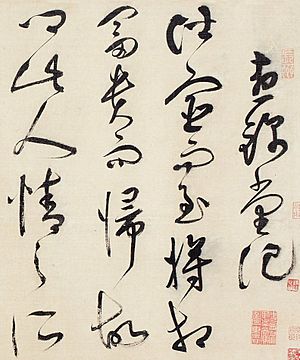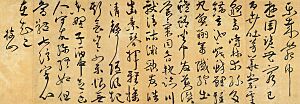Zhu Yunming facts for kids
Quick facts for kids Zhu Yunming |
|||||||||||||||||||
|---|---|---|---|---|---|---|---|---|---|---|---|---|---|---|---|---|---|---|---|
| Chinese | 祝允明 | ||||||||||||||||||
|
|||||||||||||||||||

Zhu Yunming (Chinese: 祝允明; 1461–1527) was a famous Chinese calligrapher, poet, and writer. He also worked as a scholar-official, which was a government worker who had passed special exams. Zhu lived during the Ming dynasty. He was known as one of the "Four Talents of Wu," a group of skilled artists from the Suzhou area. People admired him most for his amazing calligraphy, which is the art of beautiful handwriting. He was also popular for his free-spirited lifestyle and for thinking differently from others. Zhu questioned some traditional ideas and wrote many essays about them. His ideas even influenced other thinkers like Li Zhi.
About Zhu Yunming
Early Life and Talents
Zhu Yunming was born in 1461 in Changzhou County, which is now part of Suzhou, Jiangsu Province. His courtesy name was Xizhe (希哲), and his art name was Zhishan (枝山). He was born with an extra thumb on one hand. Because of this, he called himself the "Zhizhi Scholar."
People said Zhu was very talented from a young age. He could write calligraphy with large characters when he was only four years old. By the age of eight, he was already writing poetry. He became a certified student at 16. In 1492, he passed a big provincial exam. However, he never passed the even harder national exams.
His Career and Later Life
In 1514, Zhu Yunming became the county magistrate of Xingning in Guangdong. A county magistrate was like a mayor or local governor. During his five years there, he helped write the official history book for Xingning County.
In 1521, he got a promotion to Controller-General of Yingtian Prefecture. This area is now modern Nanjing. But he resigned in less than a year because he was ill. For the rest of his life, Zhu focused on his writing and art. He passed away in 1527.
A Unique Thinker
Zhu Yunming was one of the "Four Talents of Wu (Suzhou)" (吴中四才子). The other talents were Tang Yin, Wen Zhengming, and Xu Zhenqing. Zhu's calligraphy was the most famous among them. He was very good at writing in a small, neat style called xiaokai. But he was most famous for his wild-cursive style, called kuangcao. This style is very expressive and free. His friends believed his energetic personality matched his wild calligraphy.
Zhu was also known for his unusual ideas. He often thought differently from the traditional teachings of his time. Later in his life, he even called himself a "wild man." He wrote many notes and essays. Some experts believe his writings about historical figures influenced the philosopher Li Zhi.
|
 | Aaron Henry |
 | T. R. M. Howard |
 | Jesse Jackson |


